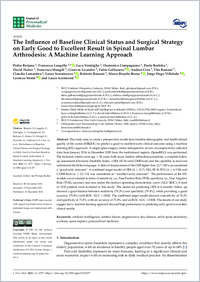The influence of baseline clinical status and surgical strategy on early good to excellent result in spinal lumbar arthrodesis : a machine learning approach
- Berjano, Pedro IRCCS Istituto Ortopedico Galeazzi, Milan, Italy
- Langella, Francesco ORCID IRCCS Istituto Ortopedico Galeazzi, Milan, Italy
- Ventriglia, Luca Istituto Dalle Molle di studi sull'intelligenza artificiale (IDSIA), Facoltà di scienze informatiche, Università della Svizzera italiana, Svizzera
- Compagnone, Domenico IRCCS Istituto Ortopedico Galeazzi, Milan, Italy
- Barletta, Paolo IRCCS Istituto Ortopedico Galeazzi, Milan, Italy
- Huber, David ORCID Istituto Dalle Molle di studi sull'intelligenza artificiale (IDSIA), Facoltà di scienze informatiche, Università della Svizzera italiana, Svizzera
- Mangili, Francesca ORCID Istituto Dalle Molle di studi sull'intelligenza artificiale (IDSIA), Facoltà di scienze informatiche, Università della Svizzera italiana, Svizzera
- Licandro, Ginevra Istituto Dalle Molle di studi sull'intelligenza artificiale (IDSIA), Facoltà di scienze informatiche, Università della Svizzera italiana, Svizzera
- Galbusera, Fabio ORCID IRCCS Istituto Ortopedico Galeazzi, Milan, Italy
- Cina, Andrea IRCCS Istituto Ortopedico Galeazzi, Milan, Italy
- Bassani, Tito IRCCS Istituto Ortopedico Galeazzi, Milan, Italy
- Lamartina, Claudio IRCCS Istituto Ortopedico Galeazzi, Milan, Italy
- Scaramuzzo, Laura ORCID IRCCS Istituto Ortopedico Galeazzi, Milan, Italy
- Bassani, Roberto IRCCS Istituto Ortopedico Galeazzi, Milan, Italy
- Brayda-Bruno, Marco ORCID IRCCS Istituto Ortopedico Galeazzi, Milan, Italy
- Villafañe, Jorge Hugo ORCID IRCCS Fondazione Don Carlo Gnocchi, Milan, Italy
- Monti, Lorenzo ORCID Orthopedics and Traumatology Unit, Istituto Clinico Villa Aprica, Como, Italy
- Azzimonti, Laura ORCID Istituto Dalle Molle di studi sull'intelligenza artificiale (IDSIA), Facoltà di scienze informatiche, Università della Svizzera italiana, Svizzera
- 2021
Published in:
- Journal of Personalized Medicine. - 2021, vol. 11, no. 12, p. 1377
Artificial intelligence
Lumbar fusion
Degenerative disc disease
Adult spine deformity
Scoliosis
Spine registry
Personalized medicine
English
The study aims to create a preoperative model from baseline demographic and health- related quality of life scores (HRQOL) to predict a good to excellent early clinical outcome using a machine learning (ML) approach. A single spine surgery center retrospective review of prospectively collected data from January 2016 to December 2020 from the institutional registry (SpineREG) was performed. The inclusion criteria were age ≥ 18 years, both sexes, lumbar arthrodesis procedure, a complete follow up assessment (Oswestry Disability Index—ODI, SF-36 and COMI back) and the capability to read and understand the Italian language. A delta of improvement of the ODI higher than 12.7/100 was considered a “good early outcome”. A combined target model of ODI (∆ ≥ 12.7/100), SF-36 PCS (∆ ≥ 6/100) and COMI back (∆ ≥ 2.2/10) was considered an “excellent early outcome”. The performance of the ML models was evaluated in terms of sensitivity, i.e., True Positive Rate (TPR), specificity, i.e., True Negative Rate (TNR), accuracy and area under the receiver operating characteristic curve (AUC ROC). A total of 1243 patients were included in this study. The model for predicting ODI at 6 months’ follow up showed a good balance between sensitivity (74.3%) and specificity (79.4%), while providing a good accuracy (75.8%) with ROC AUC = 0.842. The combined target model showed a sensitivity of 74.2% and specificity of 71.8%, with an accuracy of 72.8%, and an ROC AUC = 0.808. The results of our study suggest that a machine learning approach showed high performance in predicting early good to excellent clinical results.
- Collections
- Language
-
- English
- Classification
- Computer science and technology
- License
- CC BY
- Open access status
- gold
- Identifiers
-
- DOI 10.3390/jpm11121377
- ARK ark:/12658/srd1324941
- Persistent URL
- https://n2t.net/ark:/12658/srd1324941
Statistics
Document views: 22
File downloads:
- Langella_2022_MDPI_jpm.pdf: 36
